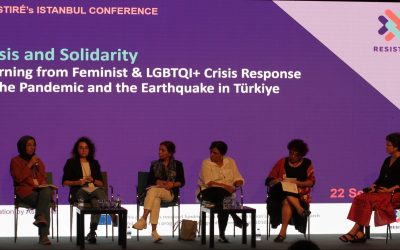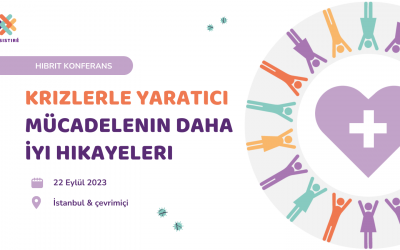How have the policy responses to Covid-19 increased gender inequalities? What can policymakers, employers or even civil society organisations do to mitigate the impact of these policies?
Concluding its first research cycle, the RESISTIRE project is delivering a set of 8 factsheets to support policymakers, advisers, employers, and civil society organisations in understanding the social, economic, political, and environmental effects of Covid-19 policy responses on gender equality, and to suggest practical recommendations to mitigate these effects. These recommendations can also serve to safeguard against the societal impacts of future crises.
Factsheet 1: Pandemic and gender mainstreaming
Decades of work towards intersectional gender mainstreaming wiped out during the crisis.
Although gender mainstreaming has been adopted as an approach in EU policymaking for over two decades, national-level policies are largely still not mainstreamed. Gender mainstreaming should not only be an ambition, it should also be implemented, monitored, and evaluated, with concrete results and impact. In particular, policies should not only focus on so-called “traditional” or “typical” family models, citizenship criteria, and standard employment contracts, as this focus results in the exclusion of large segments of European societies (e.g., LGBTQI+ people, the unemployed, migrants etc.).
Factsheet 2: Women representation, diversity and inclusion in decision-making
Ensuring gender-balanced decision-making and the involvement of civil society organisations.
Several studies highlight the extent of women’s under-representation in decision-making and the invisibility of their voices in policy responses to the COVID-19 pandemic. A greater representation of women in decision-making, combined with an explicit focus on diversity and inclusion, can make a significant contribution in overturning the worst effects of Covid-19 responses on inequalities. A higher women’s presence in decision-making means that women’s interests are more likely to be addressed in policy discussions and outcomes.
Factsheet 3: Gender equality in the healthcare sector
Gender Equality Plans should be mandatory in Hospitals
The pandemic has made visible the need for hospitals to offer the adapted working conditions and to deliver a service of the highest quality. Healthcare workers are leaving the sector faster than ever because of poor working conditions, lack of an adequate work-life balance, and work-related safety and health risks, which were exacerbated during the pandemic. Gender Equality Plans (GEPs) are a proven method to initiate a process of sustainable institutional change to the benefit of the quality of care, that is linked to the motivation and well-being of the people working in hospitals.
Factsheet 3: Gender equality in the healthcare sector
Factsheet 4: Green spaces and gentrification
Green spaces for everyone!
COVID-19 and the associated policy measures that curbed vast stretches of public life highlighted the need for more urban green spaces, as people started to utilise existing green areas significantly more (in countries where parks and other green spaces were not closed down). This trend also emphasised the fact that some neighbourhoods – often populated by vulnerable socioeconomic groups, such as ethnic minorities, low-skilled and informal workers, etc. – have a lot less green space than others, exacerbating physical and mental health problems, as well as making it more difficult for people to socialise and engage in community-building.
Factsheet 5: Care and Crisis
Fostering a Paradigm Shift
The COVID-19 crisis has reinforced many pre-existing inequalities, and simultaneously made them more visible. The lockdowns brought with them the closure of many care facilities and the requirement to stay at home, which strongly impacted people with caring responsibilities, whether it be for children, elderly people, people with a disability, and/or others. But the situation impacted men and women in different ways, as the gender care gap was exacerbated and women took up more care work.
Factsheet 6: Reinforcing EU-level action to combat Gender-based violence
Through the Istanbul Convention
Emerging global and national data show increases in gender-based violence and increases in the reported number of cases of gender-based violence against women and LGBTQI persons during the COVID-19 pandemic. The failure to finalise the adoption of the Istanbul Convention at the EU level is a contributing factor to increasing the conditions for and occurrences of gender-based violence during the pandemic.
Factsheet 7: Improving national responses to gender-based violence
Lessons from the pandemic crisis
There has been a noticeable increase in GBV during the Covid-19 pandemic, not only against women but also against LGBTQI persons. RESISTIRÉ analysis shows that a majority of countries failed to address issues of gender-based violence in their COVID-19 policy response and while civil society organisations managed to react in some instances, the pandemic also put pressure and circumscribed their range of activities.
Factsheet 8: Telework as a double-edged sword
Risks and opportunities
The COVID-19 crisis led to the rapid and widespread adoption of telework in a multitude of sectors to curb the spread of the virus, while also allowing organisations and companies to continue their activities. This sudden imposition of telework strongly impacted the relationships of people with regards to their jobs and their work-life balance, though these effects, both positive and negative, were not experienced in equal measure across all societal groups. However, while telework can, for instance, reinforce existing gender care and labour gaps, it can also serve as a catalyst for narrowing these gaps.



